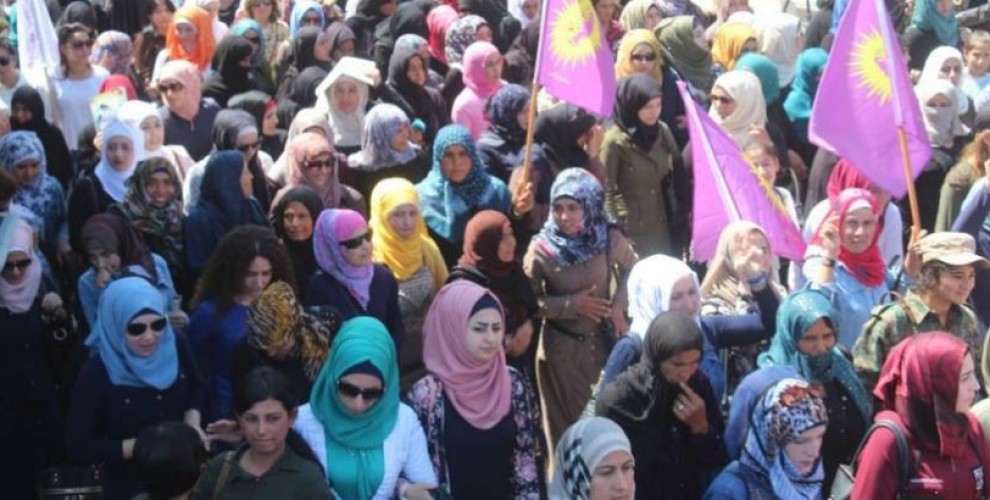Women of Manbij: Building a new society
Women played a prominent role in the liberation of Manbij in 2016 and are now leading the creation of the new city.
Women played a prominent role in the liberation of Manbij in 2016 and are now leading the creation of the new city.

The city of Manbij and its villages were liberated on 12 August 2016 by the Manbij Military Council and the Syrian Democratic Forces (SDF).
The DAESH (ISIS) mercenaries who had occupied the city didn’t just seek to destroy the buildings but also wanted the destruction of cultural, social, economic life.
The most fascinating and ancient cultural and ethnic structures of the Middle East were subjected to hardships and violence. Attacked by mercenaries coming from a variety of countries around the world, united by their reactionary mentality and determined to force the peoples of Manbij into a unification that transcended even the nation-state peculiarity.
WOMEN, THE MOST OPPRESSED
Women were no doubt the section of society most hit by this reactionary mentality and practices. In fact DAESH mercenaries not only considered women an object but also they reduced them into slaves.
And like slaves they were beaten, used, abused, raped, sold at markets.
All of this, in the name of Islam.
DAESH tried in this way to reconcile women with the historical role women have been relegated to.
This attempt, however, not only failed but turned women into the leading and inspiring force of the liberation struggle which followed in Manbij like everywhere else in Northern Syria.
FREEDOM IS ON THE DOORSTEP...
Since 12 August 2016, many things have changed. The political and social revolution is now two years underway.
There was a need for urgent change in order to save the Manbij people from the DAESH influence. Manbij was a city rich in culture and literature for decades. Yet it takes time to overcome the heavy damage and scares left on people by the reactionary and radical ideologies of the DAESH mercenaries.
In the activities initiated in and around the city soon after the liberation, women took part in self-organization activities. This time a new system of thinking, the Democratic Nation based on women's freedom, was being promoted.
Women's organization and institutional work did not actually begin after the liberation, they had begun before.
Manbij women had taken part in the founding of the Manbij Civil Council, which was established a few months before the city was fully liberated, on 5 April 2016.
The first Women's House of Manbij was opened on 25 October 2016, two months after the city was liberated from DAESH mercenaries.
In the Women's Houses, women got support to find solutions to their problems and became aware of their role.
Eventually, Manbij Women's Council was established in order to organize all the women's organizations in the city and the women in the institutions under one roof and to develop solutions for all their problems.
Women's Houses operate now under the Manbij Women's Council.
Parallel to that, the Women's Economics Committee, another agency affiliated to the Council, has also been working to develop special economic projects for women, provide job opportunities and work to help women having an autonomous economy.
PROJECTS BY AND FOR WOMEN
The Manbij Women's Council has launched several projects such as Bêt El-Berekê, a women-led winter food production co-operative.
Manbij Women's Council President, Meha al-Ali, said that women's organizations have undergone major changes in their work in recent years.
“Women were not much involved in institutions in the past. But now all the institutions have a strong women presence”, she said.
Confirming that women are present in institutions at a rate of 60 percent, Mehra al-Ali said that this rate is satisfactory and added: "There is no distinction among women, no matter who or what they are. We are women-rooted on community groups”.
The Women's Council works hard to get all women organised. Since the beginning of the year, the parliamentary authorities have visited some 6,800 families, held meetings for the resolution of the problems women face, and conducted discussions to improve the working style of the Council.
Mehra al-Ali, who stated that they wanted to come together with all the women in the city and evaluate the work of the Council, also noted that the women attended positively and approved the Council work.
The Manbij Women's Council is scheduled to hold its conference by the end of this year.
The Council will establish women's communes and general communes and assemblies in the city.
EDUCATION AND ACADEMIES
Manbij Legislative Council deputy co-chair, Ezab Al-Abuq said that women played a visible role in society and worked hard for the liberation of the city.
The academies established in the region and the education sessions and courses are playing an important role in the awareness and organization of the women of the region.
The martyr Rojda-Amara Academy was established in the city on 17 February 2017.
Martyr Zilan Heleb Academy has played an important role in the education of women now in the institutions.
Philosophy, history, women’s history, jineology, the principles of the Democratic Nation Project are all issues dealt in seminars and courses.
There is no specific law on women's defense in Manbij as there is in other regions of northern Syria, but the Legislative Council and the Women’s House are working on a draft law.
The law is expected to be released soon.
Women have developed and promoted many different institutions, projects and suggestions and they are playing a leading role in the construction and development of the new society.